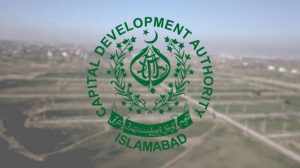New Potohar Water Board proposed as CDA struggles with sector expansion, falling investor confidence, and a staggering supply shortfall

ISLAMABAD, July 4: After more than a decade in bureaucratic freeze, the Tarbela Water Scheme—originally proposed in 2008—is being revived by the federal government in an urgent bid to address the deepening water crisis in Islamabad and Rawalpindi. The plan envisions delivering 200 million gallons per day (mgd) to the twin cities, where demand has far outpaced supply, and institutional delays have worsened water scarcity.
To execute the project, the government is planning to establish the Potohar Water Board, a dedicated body that will coordinate implementation across key institutions including the Capital Development Authority (CDA), Rawalpindi Development Authority (RDA), Cantonment Boards, DHA, and the Islamabad Capital Territory Administration (ICTA).
The decision follows the recommendations of a task force co-chaired by Interior Minister Mohsin Naqvi and Adviser to the Prime Minister Syed Tauqir Hussain Shah, acting on directives from Prime Minister Shehbaz Sharif.
Population Boom, Planning Bust
Islamabad’s population has tripled since 1998, from 800,000 to over 2.2 million, with projections estimating 3 million residents by 2030. Yet, the city is still dependent on water infrastructure from the 1980s and 1990s, with no new reservoir or transmission system added in over 30 years.
A 2022 study by the Pakistan Council of Research in Water Resources (PCRWR) warned that Islamabad could face systemic outages in key sectors unless new water sources are added urgently. With underground aquifers dropping by 1–1.5 feet per year, even emergency solutions like boreholes are nearing collapse.
Sector Schemes Stagnate as Investors Walk Away
With many sectors receiving water on alternate days or not at all, and rural Islamabad reliant on boreholes, the crisis is already manifesting in water tanker dependence, falling groundwater levels, and public discontent.
As water insecurity grows, CDA’s sector development model is crumbling. Residential schemes such as I-12, E-12, C-15, and C-16—launched to generate revenue through land sales—are struggling to attract investors due to the absence of guaranteed water supply.
This has left CDA in a financial bind, as sector revenues are essential to fund salaries for its 15,000-plus staff, foot rising electricity bills, and finance essential services.
“The sector model is collapsing under its own contradictions—plots can’t sell if water can’t flow,” admitted a planning official.
Roads over Reservoirs
Despite worsening shortages, CDA has prioritized high-profile road and flyover projects over water infrastructure. In the last five years, over Rs140 billion has been spent on roadworks such as Margalla Avenue, 7th Avenue Interchange, and the Bhara Kahu Bypass.
Meanwhile, not a single proposed dam—Chiniot, Shahdara, or Chahan—has broken ground. Plans have remained mired in administrative approvals, environmental clearances, and budgetary inaction.
The National Assembly Standing Committee on Interior, chaired by MNA Raja Khurram Nawaz, has repeatedly flagged these failures. In its May 2024 session, it stated: “The CDA is issuing new sector plans while ignoring water supply. It’s a dangerous game of planning without sustainability.”
The Way Forward
The Tarbela Water Scheme, first drafted in 2008, aims to transport 200 mgd through a 60-kilometre pipeline from Tarbela Dam to a treatment facility at Sangjani, before routing it to various parts of Islamabad and Rawalpindi.
The cost—initially estimated at Rs70 billion—has now surged to Rs220–240 billion due to inflation, land prices, and technological upgrades. Officials say that once the Potohar Water Board is legally constituted, project implementation will begin, with a target completion timeline of three years.
The board’s mandate will include inter-agency coordination, procurement oversight, and securing donor and public financing.
The success of the Tarbela Water Scheme will depend on funding commitments, technical execution, and the government’s ability to overcome the institutional inertia that has stalled every major water project for over a decade.
“Islamabad is becoming a capital of contradictions—expanding on paper, drying up on the ground,” said an urban planner who advised the CDA master plan review.
 Radio News Network Radio News Network
Radio News Network Radio News Network
